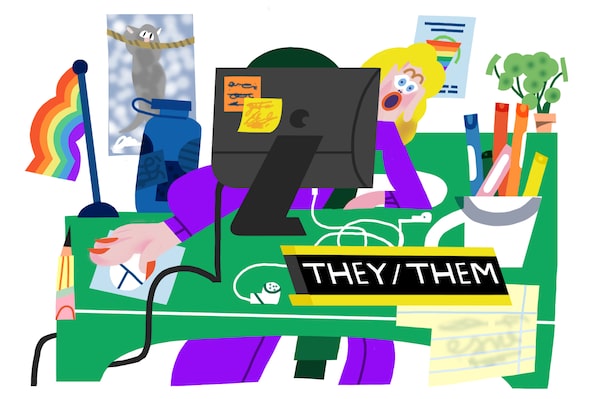
Spencer Ashley
Supporting gender diversity and referring to coworkers by their chosen gender pronoun is no longer the exception but the norm in the modern workplace.
Still, gender discrimination persists, and there can be consequences for companies that don’t comply.
Last fall, for instance, server Jessie Nelson was awarded $30,000 from Buono Osteria, their former employer, after the B.C. Human rights tribunal found they were discriminated against and terminated based on their non-binary gender identity and preference for the pronouns they/them.
In addition to the payout, the restaurant was ordered to provide training in human rights, including an employee’s right to choose their pronouns.
Caitlin Downie, who leads the equity and inclusion office for the regional municipality of Wood Buffalo in Fort McMurray, Alta., says stories like these are too common.
“These incidents demonstrate the need for employers to take pro-active actions to foster inclusive and safer workplaces for employees,” says Ms. Downie, who is also chair of the Canadian Commission for UNESCO’s Coalition of Inclusive Municipalities.
She applauds Nelson for their bravery. “Undertaking a human rights complaint is difficult to navigate and it takes a toll emotionally and financially; so, it is encouraging to see the decision from the B.C Human Rights Tribunal upholding the protection of gender rights.”
Ms. Downie understands that introducing pronouns into the workplace can feel overwhelming and she advises organizations to take small steps at first.
“Employers can begin with normalizing the usage of pronouns by leaders and champions to create a shift in the culture,” she says.
Adding pronouns to corporate signatures is a good place to start, along with more education, adds Michael Bach, founder and chief executive officer of The Canadian Centre for Diversity and Inclusion.
“It doesn’t have to be a half-day training with me,” Mr. Bach says. “It’s as simple as here’s some great articles about the importance of pronouns … and making sure your people understand why we’re doing this.”
He suggests seeking out information from organizations such as the National Institutes of Health and other online resources that explain gender identity terms such as trans, non-binary and intersex.
Mr. Bach, who consults on gender-inclusive policies for companies such as global legal firm Dentons and business consulting firm Accenture Canada, also says to expect missteps while your workplace embraces new gender pronouns.
“As long as you’re being thoughtful, you’re on the right track,” he says. “But if you do nothing, that’s worse than making a mistake.”
If you do misgender someone in conversation or in an e-mail, Mr. Bach suggests apologizing, correcting it and learning from your mistake.
“You don’t want to make a big deal about it. The person who is on the receiving end doesn’t want to make a big deal of it either. They just want to go on with their lives, too,” he says.
The biggest barrier to overcome when introducing pronouns is ignorance, Mr. Bach says. But he says crossing it can be worthwhile because a gender-inclusive workplace environment helps attract and retain staff and boost productivity.
A 2020 survey conducted by New York City’s Lesbian, Gay, Bisexual & Transgender Community Center shows employees who experience more “negative touchpoints” when it comes to diversity and inclusion are 40 per cent less productive and 13 times more likely to quit a job.
A Monster.com survey also shows 83 per cent of Gen Z candidates value a company’s commitment to diversity and inclusion when choosing an employer. And Statistics Canada cites that this next generation already makes up 20 per cent of the country’s labour force.
Having avenues to discuss pronouns also builds a safe place where employees feel valued, Mr. Bach says.
“When you consider the rate of discrimination and violence experienced by trans, non-binary and gender nonconforming people; safety is high on their list of [priorities],” he adds.
Zoya Zayler, Accenture Canada’s inclusion and diversity leader, says she consulted Mr. Bach to help nurture diversity and equity inclusion programs at the consulting firm. Accenture implemented the use of pronouns in its internal Intranet page in 2018 and Ms. Zayler says it has made a positive impact across the organization.
“Having a focus on gender diversity means we can have a workplace that is more reflective of the communities we operate in, the clients we serve, and the labour force we pull from,” she says. “We now have a workplace where people can successfully build trust-based relationships, which ultimately helps us provide more innovative and better solutions.”
In her role, Ms. Zayler partners with employees who express their gender at work and attends meetings with an internal gender authenticity support group created for gender diverse colleagues and for employees with children who are gender diverse.
“I have had people tell me that seeing [someone wear an] ally badge, when we were physically in the office, created a culture of much more comfort and inclusion. It’s small steps like that that can make a real impact,” Ms. Zayler says.